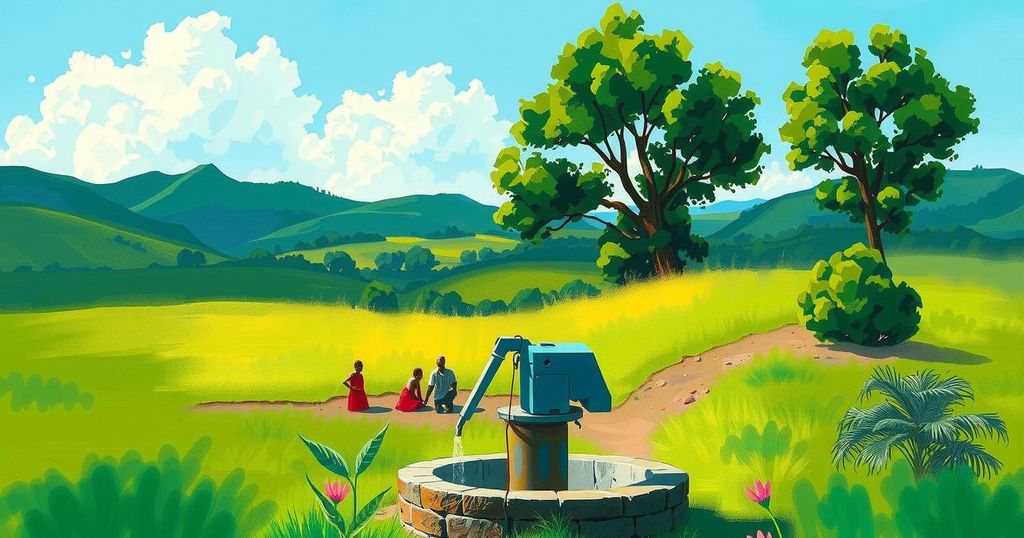World news
ABRO, AFRICA, BUJUMBURA DISTRICT, BURUNDI CONFERENCE, CI, CIMPAYE VALENTINE, DISASTER MANAGEMENT, DISASTER RELIEF, EMERGENCY RESPONSE, FLOODING, INTERNATIONAL AID, NATURAL DISASTERS, NYABUNYEGERI, ORG, PATRICK ABRO, RUBIRIZI, RUBURIZI, SURVIVORS, THE UNITED METHODIST CHURCH, UGANDA, UMNEWS, UNITED METHODIST BOARD OF GLOBAL MINISTRIES, UNITED METHODIST CHURCH, UNITED METHODIST CHURCH OF BURUNDI, UNITED METHODIST COMMITTEE ON RELIEF, VALENTINE
Jamal Robinson
0 Comments
Drilled Borehole Brings Hope and Health to Ruburizi, Burundi
The United Methodist Church has drilled a borehole in Ruburizi, Burundi, providing access to drinking water for 5,000 residents. Funded by the United Methodist Committee on Relief, the initiative addresses urgent needs following natural disasters and aims to reduce water-borne diseases and violence against women. The borehole significantly shortens water collection time, improving daily life and local economic activities.
In an effort to combat water-borne diseases prevalent in Burundi, The United Methodist Church has successfully drilled a borehole in the parish of Ruburizi, enhancing access to drinking water for approximately 5,000 residents. This initiative, funded by the United Methodist Committee on Relief, began in March 2023 to address severe water scarcity following natural disasters in 2022.
The borehole project is part of the “Relief and Recovery Assistance to Flood Survivors at Nyabunyegeri, Rubirizi and Kirekura.” Patrick Abro, a missionary from the United Methodist Board of Global Ministries, stated that this borehole addresses the water shortages exacerbated by flooding and landslides that had compromised existing water sources. The Rev. Cimpaye Valentine underlined the dual objective of this project: to provide drinking water and reduce the risk of diseases caused by inadequate hygiene, particularly for women and girls, who often face violence while fetching water from distant sources.
Before the borehole was installed, women and girls had to walk five miles, taking up to two hours to obtain water. This new borehole, which has a capacity of 160 gallons per hour, has significantly reduced this burden, with the farthest water point now only one-third of a mile away. “This drilling is the symbol of the hope that God gives to this community,” Abro remarked, citing biblical references about the source of eternal life.
Community members have expressed their gratitude towards this initiative. Christine Ntamubano, a 70-year-old widow, shared her joy about accessing drinking water conveniently, as prior water sources in rivers led to illnesses. The Rev. Buratangaje Japhet mentioned that the borehole has spurred an increase in worship attendance and new congregants as a reflection of the church’s compassion for the community in distress.
Additionally, the borehole has positively impacted local economic activities, allowing children to engage more in household and agricultural tasks. Manirakiza Geneviève commented on the ease with which they can now water vegetable fields, consequently improving family health. Local sector manager Nshimirimana Japhet acknowledged The United Methodist Church’s support and emphasized the necessity of protecting the borehole while advocating for expanded drinking-water access in surrounding areas. He highlighted the pivotal role of the borehole in reducing hygiene-related diseases, thereby enhancing public health.
Valentine concluded by stating that the borehole is not merely a project but a direct response to the pressing needs of the community, offering renewed hope to the residents.
The successful installation of the borehole in Ruburizi by The United Methodist Church marks a significant advancement in providing access to drinking water for the local population. The initiative is proving essential in alleviating water scarcity, reducing health risks, and improving community well-being. As residents embrace this accessibility, the initiative underscores the profound impact of humanitarian efforts in fostering hope and a safer living environment, especially for vulnerable groups.
Original Source: www.umnews.org




Post Comment